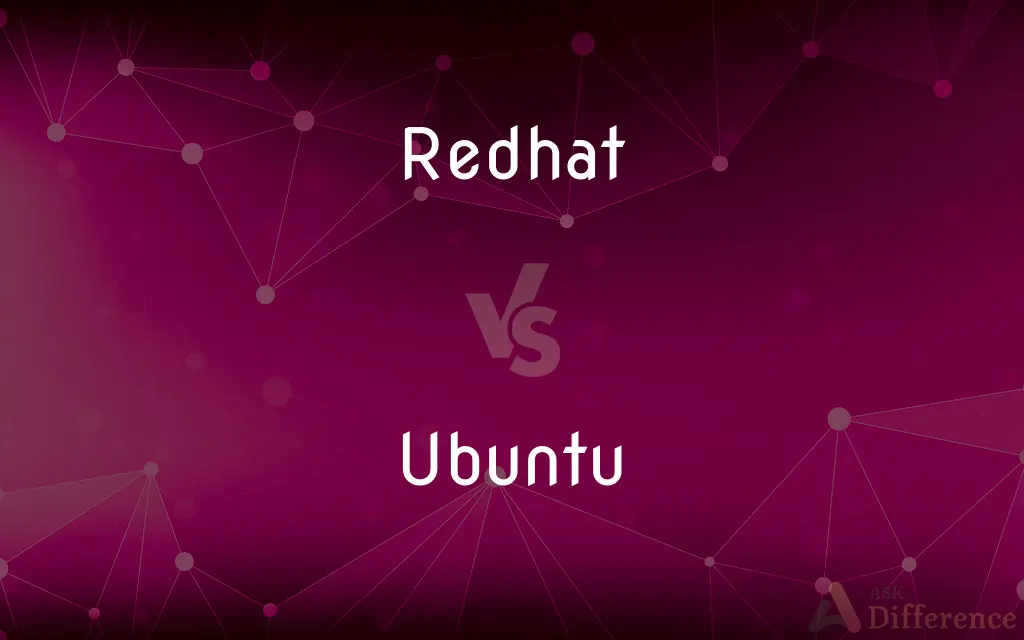Redhat vs. Ubuntu — What's the Difference?
By Tayyaba Rehman — Published on January 15, 2024
Red Hat is a company known for its enterprise Linux distributions and open-source software. Ubuntu is a popular Linux distribution known for its ease of use and community support.

Difference Between Redhat and Ubuntu
Table of Contents
ADVERTISEMENT
Key Differences
Red Hat, Inc. is a multinational software company specializing in open-source solutions. It is widely recognized for its enterprise Linux distributions, including Red Hat Enterprise Linux (RHEL). RHEL is known for its stability, security, and support, making it a popular choice for businesses and organizations that require robust, certified software.
Ubuntu is a user-friendly Linux distribution developed by Canonical Ltd. It is known for its ease of use, regular release cycle, and strong community support. Ubuntu aims to provide a desktop and server operating system that is accessible to both beginners and experienced users. It offers a vast repository of software packages and a desktop environment that emphasizes simplicity.
Red Hat primarily targets the enterprise market, focusing on providing mission-critical solutions and long-term support. In contrast, Ubuntu has a broader audience, including desktop users, developers, and server administrators, and offers both long-term support (LTS) and regular releases.
Red Hat uses a subscription-based model for support and services, which is essential for businesses. Ubuntu, on the other hand, offers a free and open-source operating system with optional paid support plans, making it accessible to a wide range of users.
Both Red Hat and Ubuntu have active and passionate communities. Red Hat's community contributes to various open-source projects, while Ubuntu's community is known for its forums, documentation, and software development.
ADVERTISEMENT
Comparison Chart
Definition
A company specializing in enterprise Linux
A user-friendly Linux distribution
Target Audience
Enterprise and business users
Desktop, server, and developer communities
Licensing
Subscription-based support model
Free and open-source with optional paid support
Long-Term Support
Provided through RHEL
Provided through LTS releases
Community
Active community contributions
Strong community forums and documentation
Compare with Definitions
Redhat
Red Hat is a leading enterprise Linux provider.
Many large organizations rely on Red Hat Enterprise Linux for their critical systems.
Ubuntu
Ubuntu is a user-friendly Linux distribution.
Ubuntu's intuitive interface makes it great for beginners.
Redhat
Red Hat contributes to open-source projects.
Red Hat's involvement in open-source communities drives innovation.
Ubuntu
Ubuntu offers regular releases.
We appreciate Ubuntu's frequent updates and new features.
Redhat
Red Hat is known for security.
Red Hat's focus on security aligns with our data protection requirements.
Ubuntu
Ubuntu has a strong community.
Ubuntu's community support helps us troubleshoot issues.
Redhat
Red Hat provides certified software.
We trust Red Hat's certified solutions for our business needs.
Ubuntu
Ubuntu is versatile.
Ubuntu serves as our desktop and server OS due to its flexibility.
Redhat
Red Hat offers long-term support.
Our company values Red Hat's reliable support for our server infrastructure.
Ubuntu
Ubuntu is open-source and free.
We use Ubuntu without licensing costs for our servers.
Common Curiosities
Can I use Ubuntu for servers and desktops?
Yes, Ubuntu is versatile and can be used as both a desktop and server operating system.
What is Red Hat Enterprise Linux (RHEL)?
RHEL is an enterprise-grade Linux distribution by Red Hat known for its stability and long-term support.
Is Ubuntu completely free and open-source?
Yes, Ubuntu is free and open-source. You can use it without licensing costs.
What is CentOS, and how does it relate to Red Hat?
CentOS is a community-driven project that aims to provide a free, open-source version of RHEL. It shares many similarities with RHEL.
Can I use Ubuntu for software development?
Yes, Ubuntu provides a robust platform for software development and supports various programming languages and development tools.
Is Red Hat Linux free?
No, RHEL is not free; it uses a subscription-based support model. However, CentOS, a downstream distribution of RHEL, is free.
What is Ubuntu LTS (Long-Term Support)?
Ubuntu LTS releases receive five years of support, including security updates and bug fixes, making them suitable for stable environments.
Which industries commonly use Red Hat solutions?
Red Hat solutions are popular in industries like finance, healthcare, telecommunications, and government due to their reliability and security.
Are there certifications available for Red Hat and Ubuntu?
Both Red Hat and Ubuntu offer certification programs for IT professionals to validate their expertise in using their respective technologies.
Which distribution is better for a beginner in Linux?
Ubuntu is often recommended for beginners due to its user-friendly interface and extensive community support.
What is the difference between Ubuntu LTS and regular releases?
LTS releases have longer support periods (five years) and are recommended for production environments, while regular releases offer the latest features but have shorter support (nine months).
Is Red Hat the same as Fedora?
No, Fedora is a community-driven distribution sponsored by Red Hat. It serves as a testing ground for technologies that may be included in RHEL.
What desktop environments are available in Ubuntu?
Ubuntu offers different desktop environments, including GNOME, KDE, Xfce, and more, allowing users to choose their preferred interface.
What is the role of the Ubuntu community in development?
The Ubuntu community plays a significant role in documentation, support forums, bug reporting, and contributing to the development of the distribution.
Can I switch from Ubuntu to Red Hat or vice versa?
Yes, it is possible to switch between distributions, but it may require reinstalling the operating system and adapting to the new environment.
Share Your Discovery

Previous Comparison
Acetic Acid vs. Acetate
Next Comparison
Commotion vs. ExcitementAuthor Spotlight
Written by
Tayyaba RehmanTayyaba Rehman is a distinguished writer, currently serving as a primary contributor to askdifference.com. As a researcher in semantics and etymology, Tayyaba's passion for the complexity of languages and their distinctions has found a perfect home on the platform. Tayyaba delves into the intricacies of language, distinguishing between commonly confused words and phrases, thereby providing clarity for readers worldwide.
















































